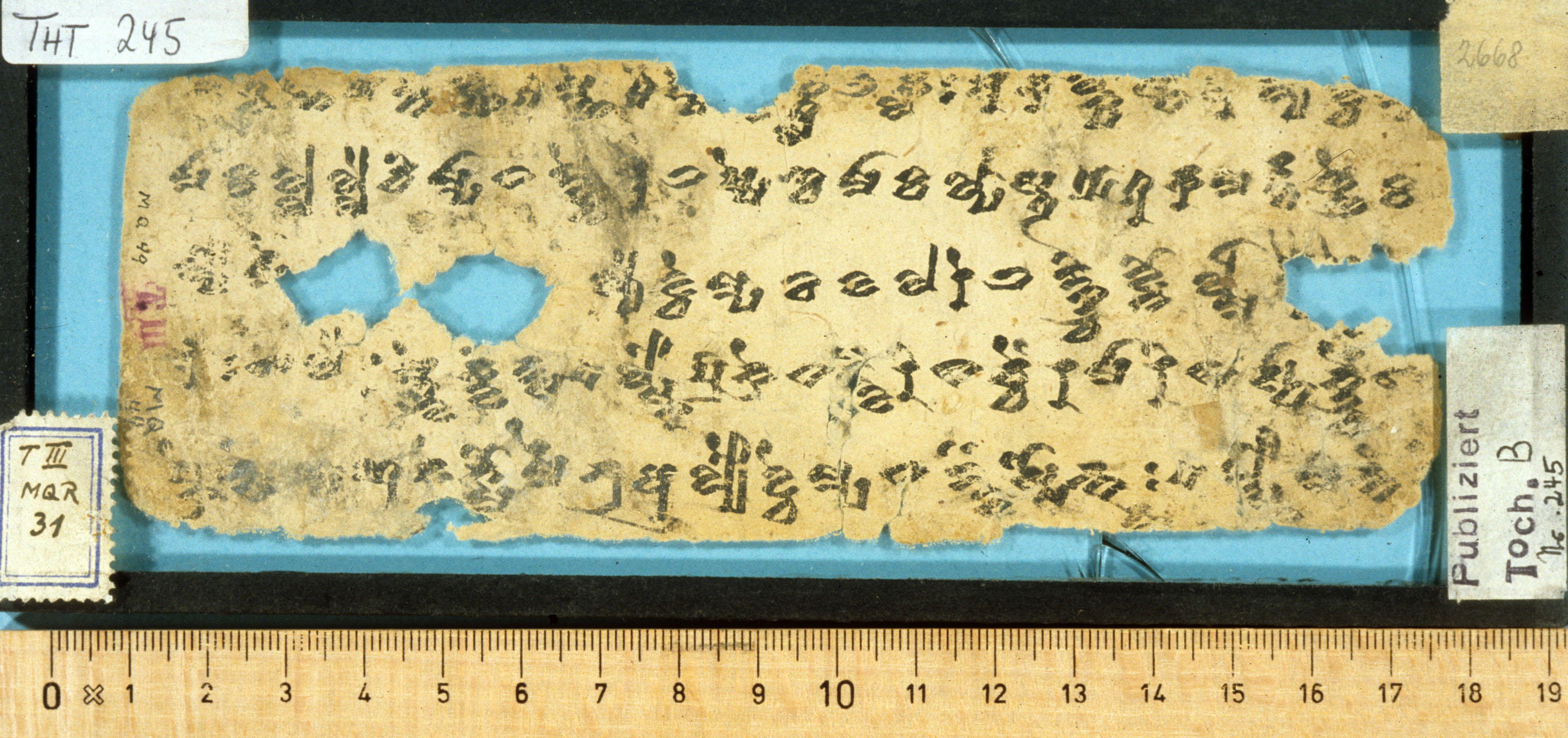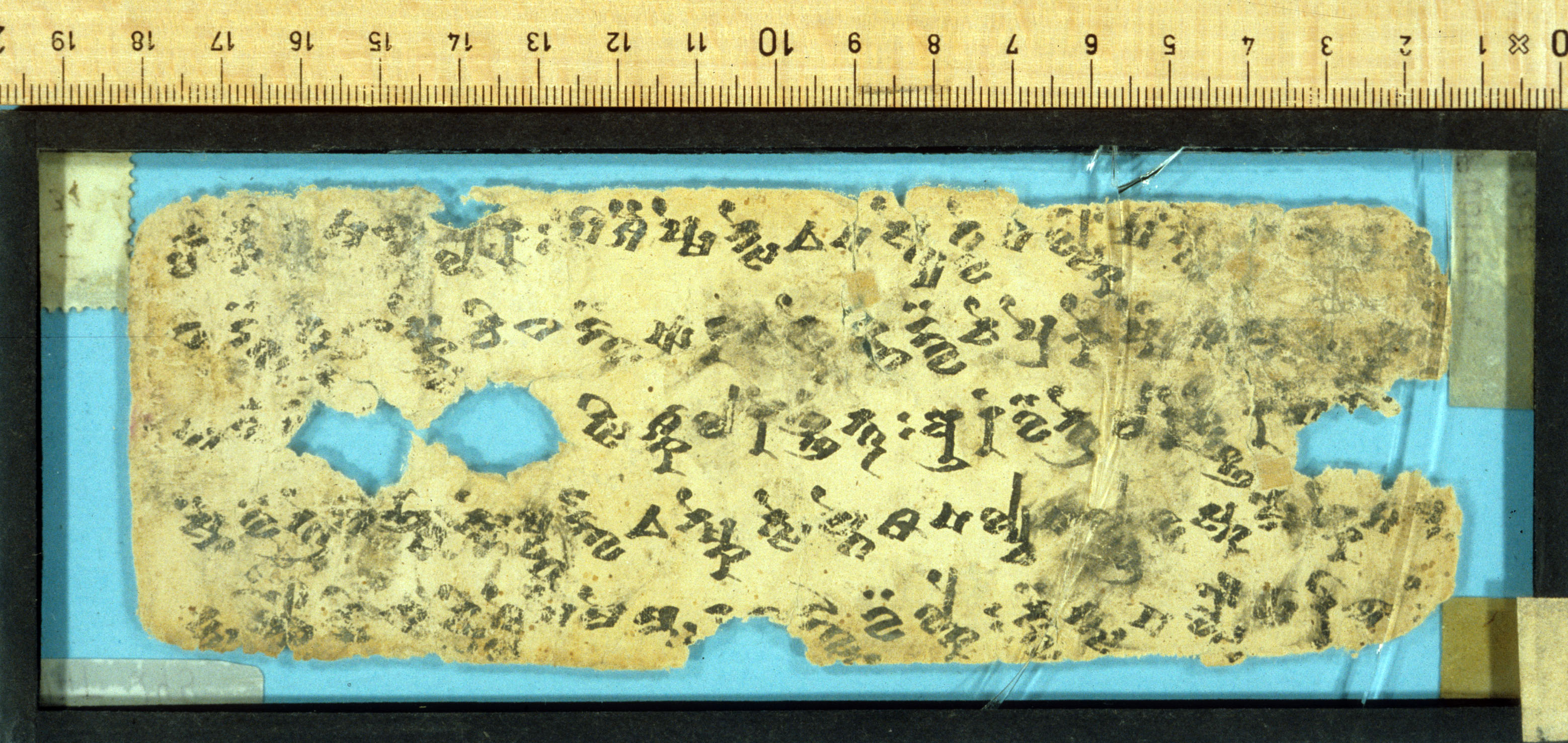THT 245
| Known as: | THT 245; B 245; Bleistiftnummer 2668 |
|---|---|
| Cite this page as: | Hannes A. Fellner; Adrian Musitz (translation). "THT 245". In A Comprehensive Edition of Tocharian Manuscripts (CEToM). Created and maintained by Melanie Malzahn, Martin Braun, Hannes A. Fellner, and Bernhard Koller. https://cetom.univie.ac.at/?m-tht245 (accessed 09 Jul. 2025). |
Edition | |
| Editor: | Hannes A. Fellner; Adrian Musitz (translation) |
Provenience | |
| Main find spot: | Kizil Ming-öy |
| Specific find spot: | Rothkuppelraum |
| Expedition code: | T III MQR 31 (on the frame), T III MQ 79 (on the frame) |
| Collection: | Berlin Turfan Collection |
Language and Script | |
| Language: | TB |
| Linguistic stage: | archaic |
| Script: | archaic |
Text contents | |
| Text genre: | Literary |
| Text subgenre: | Buddhastotra |
| Verse/Prose: | verse |
| Meter: | 444 (4x) |
Object | |
| Material: | ink on paper |
| Form: | Poṭhī |
| Size (h × w): | 6.2 × 17 cm |
| Number of lines: | 5 |
Images
Images from idp.bl.uk by courtesy of the International Dunhuang Project, the Berlin-Brandenburgische Akademie der Wissenschaften, and the Staatsbibliothek zu Berlin – Orientabteilung.
Transliteration
| a1 | – tn· [s]n· [ma] kt· [wñ]· ś[ā] mñe śai [ṣ]ṣe – kśl· la kl· : a k[ā] lkp· sta· [a] [l]y· wc· [m]·· |
|---|---|
| a2 | mā ka lla lle ci mpā ta ṅ[w]ne a la ṣṣe ñca mā ka lpā stra 10 7 ka ma rtta ññe ka |
| a3 | lpo rmeṃ – – lye wce mpa ai wa la re la ṅkuci wno lmī – – – |
| a4 | [rk]· : s̝a le ra mtwe kw[ä] ntsa pa lsko prā kre ta ṅwä ri na cceṃ ra mā ri na stā rku[c]e [s̝a] |
| a5 | pkre n[ta]ṃ [10] 8 ke kmo rme nra ā lyau wce mpa ta ṅwä sso nta[¯] [¯]t[s] : pa lsko mā ntaṃ – |
| b1 | kl· tk[o]· [t]· mā [s̝a] [p]l· ra : po śai ṣṣe ntse e pa stye twe pa lsko pā [ṣtsi] – – – – |
| b2 | ta ṅwä t[kuce] s̝a pkuse ci ta ṅwä 10 9 e nt[w]e [k]ta ṅwä ce pre ke ṣṣeṃ ś[ā] mna ·[s]· – – |
| b3 | nta [r]wa – – – tsi śkā la re ññe ntra : ā raṃ wä ntre la re wññe ra [pe] ·au – – |
| b4 | snai wä ntre [ta] ñ[po] n[ta]ṃ ṣcta ṅwä e nṣke tse ste 20 pa lyca pa lycra wa ska mo [ñ]ke ś[ā] m[na] |
| b5 | nts· l·o [r]i na [cc]i śle ṣe me mpa [ra] [ta] ṅw·ā wä lke : kwä ntsa pa ls[k]o mā rī na ·[e] |
Transcription
| 17a | 11σ a1– tn· |
|---|---|
| 17b | sn(ai) mäkt(e)wñ(e) ; śāmñe śaiṣṣe ; (sä)k śl(e) läkl(e) : |
| 17c | akālk p(o)stä(ṃ) ; aly(e)wc(e)m(pa) ; a2 mā källalle |
| 17d | cimpā täṅwne ; aläṣṣeñca ; mā kälpāsträ 10-7 |
| 18a | kamarttaññe ; käa3lpormeṃ – ; – lyewcempa |
| 18b | aiwa lare ; läṅkuci wnolmī ; – – – a4 r k(a) : |
| 18c | ṣäle ramtwe ; kwäntsa pälsko ; prākre täṅwä |
| 18d | rinäcceṃ ra ; mā rinästār ; kuce ṣäa5p krentäṃ 10-8 |
| 19a | kekmormen ra ; ālyauwcempa ; taṅwässontäts : |
| 19b | pälsko māntäṃ ; – b1 kl(au)tko(y)t(rä) ; mā ṣäp l· ra : |
| 19c | po śaiṣṣentse ; epästye twe ; pälsko pāṣtsi |
| 19d | – – – – ; b2 täṅwät kuce ṣäp ; kuse ci täṅwä 10-9 |
| 20a | entwe-k täṅwä ; ce prekeṣṣeṃ ; śāmna(nt)s · – |
| 20b | (wä)b3ntärwa – ; – – tsiś kā ; lareññenträ : |
| 20c | āraṃ wäntre ; larewññe ra ; pe ·au – – |
| 20d | b4 snai wäntre täñ ; pontäṃṣc täṅwä ; enṣketse ste 20 |
| 21a | pälyca pälyc ra ; waskamo ñke ; śāmnab5nts (pä)l(sk)o |
| 21b | rinäcci śle ; ṣemempa ra ; täṅw(s)ā wälke : |
| 21c | kwäntsa pälsko ; mā rīnä(cc)e(ṃ) ; 4σ |
Translation
| a1 | The human world is without refuge. Bliss with suffering ist not obtainable with eachother (?) according to wish. |
|---|---|
| a2 | One who, like you, restrains in love, is not found (?). |
| a2+ | Having obtained sovereignty, the light beings,,, with eachother... |
| a4 | Like a mountain, firm-minded, firm in your love, you did not renounce the renouncers |
| a4+ | - how much less the good ones? |
| a5 | Even when those who love have come to one another, if the mind hurts ... (love?) turns (away?) ... |
| b1 | You are fit to protect the mind of the whole world. ... (mind) ... |
| b1+ | and you love [beyond] the love there is to you. |
| b2 | Only then have the people of this time love, if they love to obtain things. |
| b3 | If the thing ceases [to exist], [their] love turns away too. |
| b4 | Your love to all is enduring without a thing. |
| b4+ | Unsteady like... is the mind of the people now. |
| b5 | The renouncerse have long, with love for (?) one (thing?)... firm minded, non-renouncers... |
Other
| a1+ | Glück mit Leid [ist] miteinander nicht nach Wunsch erlangbar. (Schmidt 1974: 216, fn. 1) |
|---|---|
| a2 | Einer, der wie du [wtl. zusammen mit dir] in Liebe [Glück und Leid] fernhält, wird nicht gefunden [d.h. einen, der ... fernhält, gibt es nicht]. (Schmidt 1974: 216) |
| a5+ | Even when those who love have come to one another, if the mind hurts … (love?) turns (away?) … You are fit to protect the mind of the whole world. … (mind) … and you love [beyond] the love there is to you. (cf 739) (Peyrot 2013b: 679) |
| b2+ | Nur dann (haben) die Menschen dieser Zeit Liebe, nur um Dinge zu (erlangen), lieben sie. Hört [aber] das Ding auf, [so] (wendet sich) auch die Liebe ab. (Schmidt 1974: 143) |
| b2+ | Only then have the people of this time love, if they love to obtain things. If the thing ceases [to exist], [their] love turns away too. Your love to all is enduring without a thing. (Peyrot 2013b: 679) |
References
Online access
Miscellaneous
Edition
Translations
Hackstein 1995: a2 (214), b1 (174), b4 b5 (198); Krause 1952: a4 (43); Peyrot 2013b: a5 b1 b2 (679), b2 b3 b4 (679); Schmidt 1974: a1 a2 (216 n.1), a1 a2 (216, fn. 1), a2 (216), b1 (44 n.2), b2 b3 (143); Thomas 1952: a2 (31); Thomas 1954: b1 (739); Thomas 1968: a4 (202); Thomas 1973: b5 (89); Thomas 1976: a2 a3 (228); Thomas 1979d: a1 a2 (157); Thomas 1997: b4 (89)
Bibliography
Hackstein, Olav. 1995. Untersuchungen zu den sigmatischen Präsensstammbildungen des Tocharischen. HS Erg.-Heft 38. Göttingen: Vandenhoeck & Ruprecht.
“The International Dunhuang Project: The Silk Road Online.” n.d. http://idp.bl.uk.
Krause, Wolfgang. 1952. Westtocharische Grammatik, Band I. Das Verbum. Heidelberg: Winter.
Peyrot, Michaël. 2013b. The Tocharian subjunctive. A study in syntax and verbal stem formation. Vol. 8. Brill’s Studies in Indo-European Languages & Linguistics. Leiden/Boston: Brill.
Schmidt, Klaus T. 1974. “Die Gebrauchsweisen des Mediums im Tocharischen.” PhD, Universität Göttingen.
Sieg, Emil, and Wilhelm Siegling. 1953. Tocharische Sprachreste. Sprache B, Heft 2. Fragmente Nr. 71-633. Edited by Werner Thomas. Göttingen: Vandenhoeck & Ruprecht.
Thomas, Werner. 1952. Die tocharischen Verbaladjektive auf -l. Deutsche Akad. der Wissenschaften zu Berlin, Institut für Orientforschung 9. Berlin: Akademie-Verlag.
Thomas, Werner. 1954. “Die Infinitive im Tocharischen.” In Asiatica. Festschrift Friedrich Weller. Zum 65. Geburtstag, gewidmet von seinen Freunden, Kollegen und Schülern, edited by Johannes Schubert and Ulrich Schneider, 701–64. Leipzig: Harrassowitz.
Thomas, Werner. 1968. “Zur Verwendung von toch. A oki/B ramt und A mäṃtne/B mäkte in Vergleichen.” Orbis 17: 198–231.
Thomas, Werner. 1973. “Zur Bedeutung des Tempuswechsels von Präteritum zu Präsens im Tocharischen.” Indogermanische Forschungen 78: 78–94.
Thomas, Werner. 1976. “Zur tocharischen Entsprechung von skt. tāyin.” Zeitschrift für Vergleichende Sprachforschung 89: 221–30.
Thomas, Werner. 1979d. “Zur Verwendung von A śla, B śale, śle im Tocharischen.” Zeitschrift für Vergleichende Sprachforschung 93: 150–73.
Thomas, Werner. 1997. Interpretationsprobleme im Tocharischen. Unflektiertes A puk, B po “ganz, all, jeder”. Vol. 3. SbWGF, XXXV. Stuttgart: Steiner.
Gippert, Jost, Katharina Kupfer, Christiane Schaefer, and Tatsushi Tamai. n.d. “Thesaurus Indogermanischer Text- und Sprachmaterialien (TITUS): Tocharian Manuscripts from the Berlin Turfan Collection.” http://titus.fkidg1.uni-frankfurt.de/texte/tocharic/thtframe.htm.




